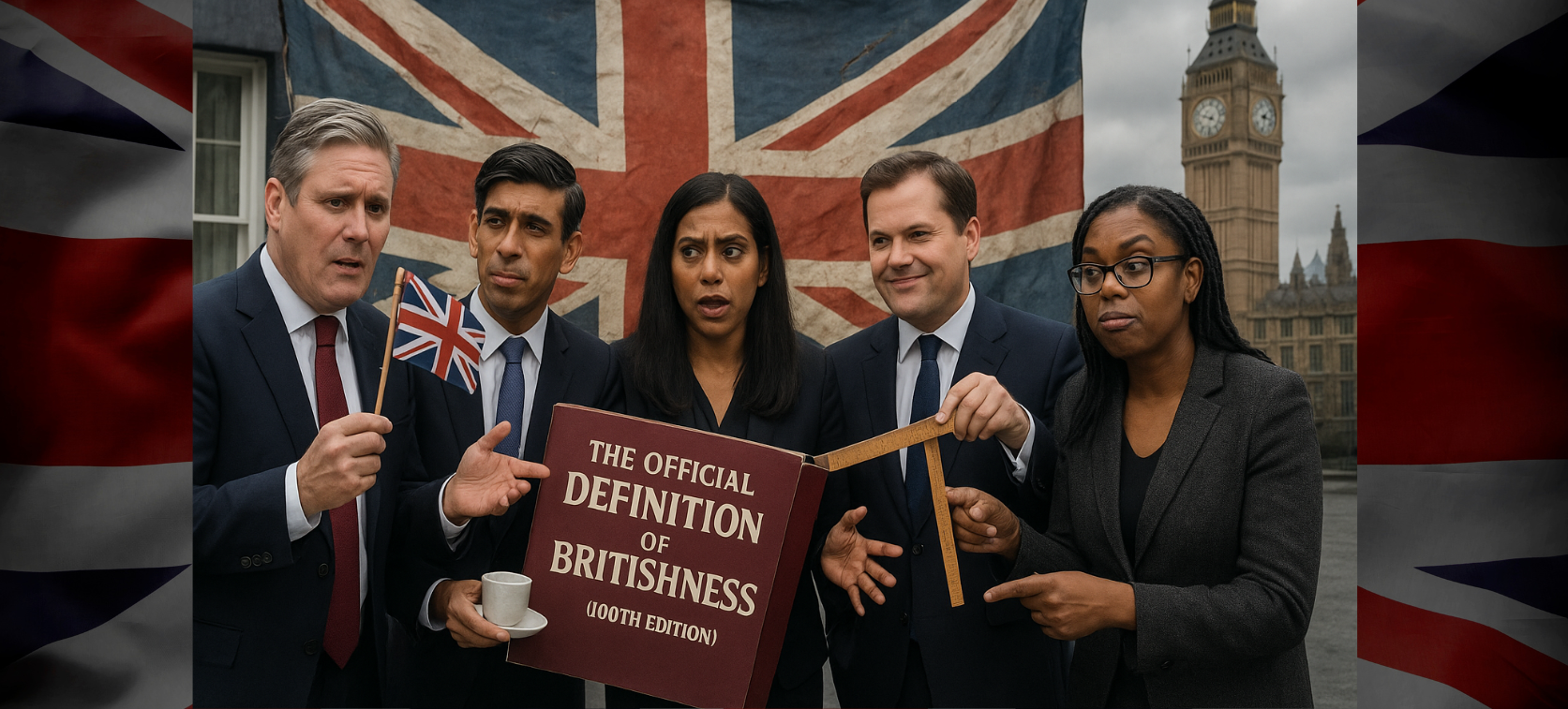There was a time when “British values” meant queueing, fair play, and pretending the empire was a humanitarian project. Now it means not seeing the bodies — preferably because we’ve redefined them as “un-British.”
Yes, Britishness has had another makeover. A hundredth, roughly. Every few years the word gets dragged out of the attic, dusted off, and beaten into new shape, usually just after a war crime needs defending.
This week’s designers were Sir Keir Starmer, Shabana Mahmood, Robert Jenrick, and Kemi Badenoch — the national style council for moral decline. Together they’ve done what no generation before dared: they’ve turned “British” from an adjective into a border.
Rule One: Obedience Is the New Virtue
Sir Keir Starmer has informed the nation that students who join pro-Palestinian marches are “un-British.” Quite right too — can’t have young people learning empathy before their first mortgage. Imagine the chaos if they start applying moral reasoning to foreign policy. Today it’s Gaza; tomorrow they’ll be questioning the monarchy.
Starmer’s message is simple: Don’t march. Don’t think. Don’t embarrass us in front of Washington. Britain was once known for dissent — now it’s known for its posture: standing straight, eyes forward, hands politely clasped behind its back while atrocities happen elsewhere.
Rule Two: Compassion Has a Curfew
After the Manchester synagogue attack, Home Secretary Shabana Mahmood declared that pro-Palestinian marches were “dishonourable.” She’s right, of course. The last thing a grieving nation needs is someone suggesting that all lives have value.
In the new Britain, mourning is a licensed activity — available exclusively to approved demographics. Other griefs may apply for permission, provided they promise not to rhyme with “Palestine.”
Rule Three: Diversity Ends Where Visibility Begins
Then there’s Robert Jenrick, who journeyed deep into Birmingham and reported, horrified, that he “didn’t see another white face.” Anthropologists will study this: the exact moment a politician mistook a city for a crime scene.
But Jenrick’s comments are not racist, he insists — merely observational. Like Darwin, but with fewer findings and more fear. He’s only worried about “integration,” by which he means: “I’d prefer the country to look more like me.”
Rule Four: Rights Are for the Weak
Kemi Badenoch, meanwhile, proposes that Britain leave the European Convention on Human Rights — the pesky post-war pact designed to stop governments doing exactly what this one wants to do. Torture, indefinite detention, deportations — the classics.
Britain invented the rule of law. Now it’s bored of it. Badenoch says leaving the ECHR will restore “sovereignty.” That’s one word for it. “Sociopathy” is another.
The New British Lexicon
- Democracy – a spectator sport.
- Protest – antisocial behaviour.
- Human rights – European nonsense.
- Diversity – cause for alarm.
- Britishness – whatever the powerful say it is this week.
We are, at last, consistent.
The Empire Finally Comes Home
Britain has spent centuries exporting cruelty under the banner of civilisation. Now, in a satisfying twist of fate, it’s decided to civilise itself the same way. What was once inflicted abroad is now administered domestically — austerity, surveillance, silence. The empire didn’t end; it just came home for tea.
And as for “hearts and minds”? Those were lost long ago. What remains is the battle of the bully — and Britain is undefeated. It no longer needs to be loved, or respected, or even believed. It just wants to be feared again.
Britishness, Redefined for the 100th Time.
This time it’s permanent. Until next week.
Need Help?
-
[email protected]
-
Follow us on Instagram
-
Follow us on TikTok
